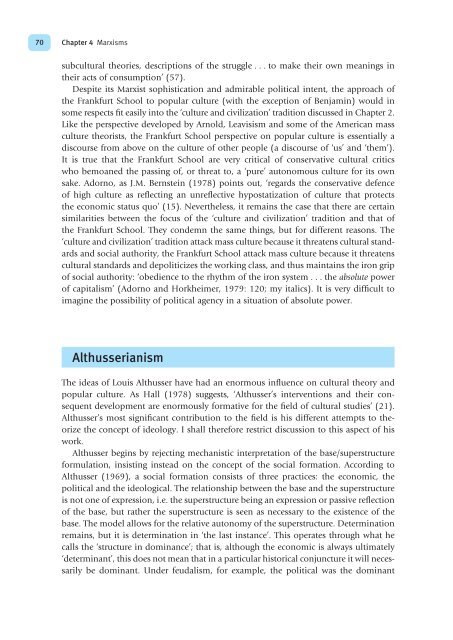Cultural Theory and Popular Culture
Cultural Theory and Popular Culture
Cultural Theory and Popular Culture
You also want an ePaper? Increase the reach of your titles
YUMPU automatically turns print PDFs into web optimized ePapers that Google loves.
70<br />
Chapter 4 Marxisms<br />
subcultural theories, descriptions of the struggle . . . to make their own meanings in<br />
their acts of consumption’ (57).<br />
Despite its Marxist sophistication <strong>and</strong> admirable political intent, the approach of<br />
the Frankfurt School to popular culture (with the exception of Benjamin) would in<br />
some respects fit easily into the ‘culture <strong>and</strong> civilization’ tradition discussed in Chapter 2.<br />
Like the perspective developed by Arnold, Leavisism <strong>and</strong> some of the American mass<br />
culture theorists, the Frankfurt School perspective on popular culture is essentially a<br />
discourse from above on the culture of other people (a discourse of ‘us’ <strong>and</strong> ‘them’).<br />
It is true that the Frankfurt School are very critical of conservative cultural critics<br />
who bemoaned the passing of, or threat to, a ‘pure’ autonomous culture for its own<br />
sake. Adorno, as J.M. Bernstein (1978) points out, ‘regards the conservative defence<br />
of high culture as reflecting an unreflective hypostatization of culture that protects<br />
the economic status quo’ (15). Nevertheless, it remains the case that there are certain<br />
similarities between the focus of the ‘culture <strong>and</strong> civilization’ tradition <strong>and</strong> that of<br />
the Frankfurt School. They condemn the same things, but for different reasons. The<br />
‘culture <strong>and</strong> civilization’ tradition attack mass culture because it threatens cultural st<strong>and</strong>ards<br />
<strong>and</strong> social authority, the Frankfurt School attack mass culture because it threatens<br />
cultural st<strong>and</strong>ards <strong>and</strong> depoliticizes the working class, <strong>and</strong> thus maintains the iron grip<br />
of social authority: ‘obedience to the rhythm of the iron system . . . the absolute power<br />
of capitalism’ (Adorno <strong>and</strong> Horkheimer, 1979: 120; my italics). It is very difficult to<br />
imagine the possibility of political agency in a situation of absolute power.<br />
Althusserianism<br />
The ideas of Louis Althusser have had an enormous influence on cultural theory <strong>and</strong><br />
popular culture. As Hall (1978) suggests, ‘Althusser’s interventions <strong>and</strong> their consequent<br />
development are enormously formative for the field of cultural studies’ (21).<br />
Althusser’s most significant contribution to the field is his different attempts to theorize<br />
the concept of ideology. I shall therefore restrict discussion to this aspect of his<br />
work.<br />
Althusser begins by rejecting mechanistic interpretation of the base/superstructure<br />
formulation, insisting instead on the concept of the social formation. According to<br />
Althusser (1969), a social formation consists of three practices: the economic, the<br />
political <strong>and</strong> the ideological. The relationship between the base <strong>and</strong> the superstructure<br />
is not one of expression, i.e. the superstructure being an expression or passive reflection<br />
of the base, but rather the superstructure is seen as necessary to the existence of the<br />
base. The model allows for the relative autonomy of the superstructure. Determination<br />
remains, but it is determination in ‘the last instance’. This operates through what he<br />
calls the ‘structure in dominance’; that is, although the economic is always ultimately<br />
‘determinant’, this does not mean that in a particular historical conjuncture it will necessarily<br />
be dominant. Under feudalism, for example, the political was the dominant
















